Two weeks ago, on Twitter, I published a ten-second video clip of US Sen. Cindy Hyde-Smith of Mississippi that made most of us from the Deep South wonder, “What in tarnation?” You see, “What in tarnation?” is an actual expression folks still use in the South, a more polite and less irreligious way of asking, “What the hell?” But what Hyde-Smith said in the video clip- “If he invited me to a public hanging, I’d be on the front row” were her precise words- is not and has never been on anyone’s list of quirky Southern euphemisms.
The New York Times interviewed Paul Reed, a sociolinguistics scholar from Alabama, who noted the phrase had appeared before in written works from the mid-1800s through the Civil Rights Era. “I cannot believe that someone would use that today,” he noted.
The video went immediately viral not because her comment was quixotic, but because in the Deep South, a reference to a “public hanging” doesn’t mean the same thing as it does in a Turner Classic Movie about the Wild West. Here, when people talk about public hangings, there is only one historical and cultural point of reference: The brutal lynchings of African Americans that continued for generations before and after the Wild West was tamed.
“Sen. Hyde-Smith’s remark is curious and could certainly be read as referencing Mississippi’s white supremacist history,” Michael Pfeifer, a history professor at John Jay College of Criminal Justice and the author of several books on lynchings, explained to the Times. “Even as an ‘expression of regard,’ this racialized historical context in Mississippi is important for understanding such a remark.”
Hyde-Smith’s opponent, Mike Espy, it just so happens, is seeking to become the first African American elected to the US Senate from Mississippi since Reconstruction. (He previously earned the distinction of becoming the first African American from elected Mississippi to the US House of Representatives, before serving a brief stint as Secretary of Agriculture during the Clinton administration).
Four days later after the “public hanging” clip, I published a second video clip of Hyde-Smith in which she seemingly endorsed targeted voter suppression efforts against liberal college students, which means something vastly different in California than it does in Mississippi, a state with seven Historically Black Colleges and Universities (HBCUs) and a population compromised of more African Americans per capita- 37%- than anywhere else in the country. Hyde-Smith may have been speaking with a group of students at Mississippi State, but she wasn’t “joking” about disenfranchising the liberals at Ole Miss, a school whose mascot was, until recently, a rebel.
In fact, while Hyde-Smith tried to defend herself as if she was merely a comedian whose humor had been taken out of context and weaponized against her (also known as the Michael Richards or Kramer from Seinfeld defense), a small group of intrepid and courageous independent journalists, almost all of whom are from Mississippi, began digging deeper.

When a four-year-old photo on Facebook of Hyde-Smith wearing a Confederate cap during a tour of Beauvoir, the “presidential” home of Jefferson Davis, most of the media, perhaps understandably, focused on that singular image.

But that image was part of a collection she posted, all under the same caption- “Mississippi history at its best!”- and the very first photo in that collection was with a man named Greg Stewart. A journalist named Judd Legum picked up on it on Twitter, though it was largely unnoticed.
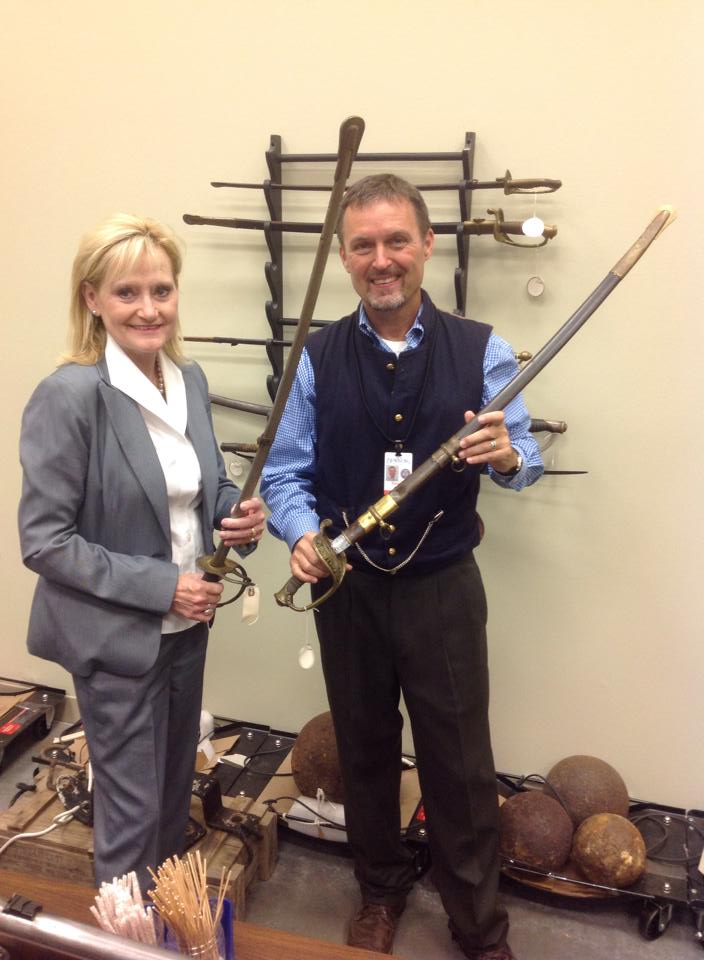
In the early 2000s, Stewart was specifically identified as a leader of a recognized hate group- Free Mississippi- by the Southern Poverty Law Center. The group went defunct, and as a result, it was de-listed by the SPLC. But you can still find his name on their database. He served as the group’s “parliamentarian.”
You can also still easily find him on Facebook, where he makes it abundantly clear that he is very much still involved in the business of the Lost Cause. (Stewart enthusiastically supported Chris McDaniel in the general election and is now cheering on Hyde-Smith).
Here is just a sampling of Stewart’s public posts on Facebook:
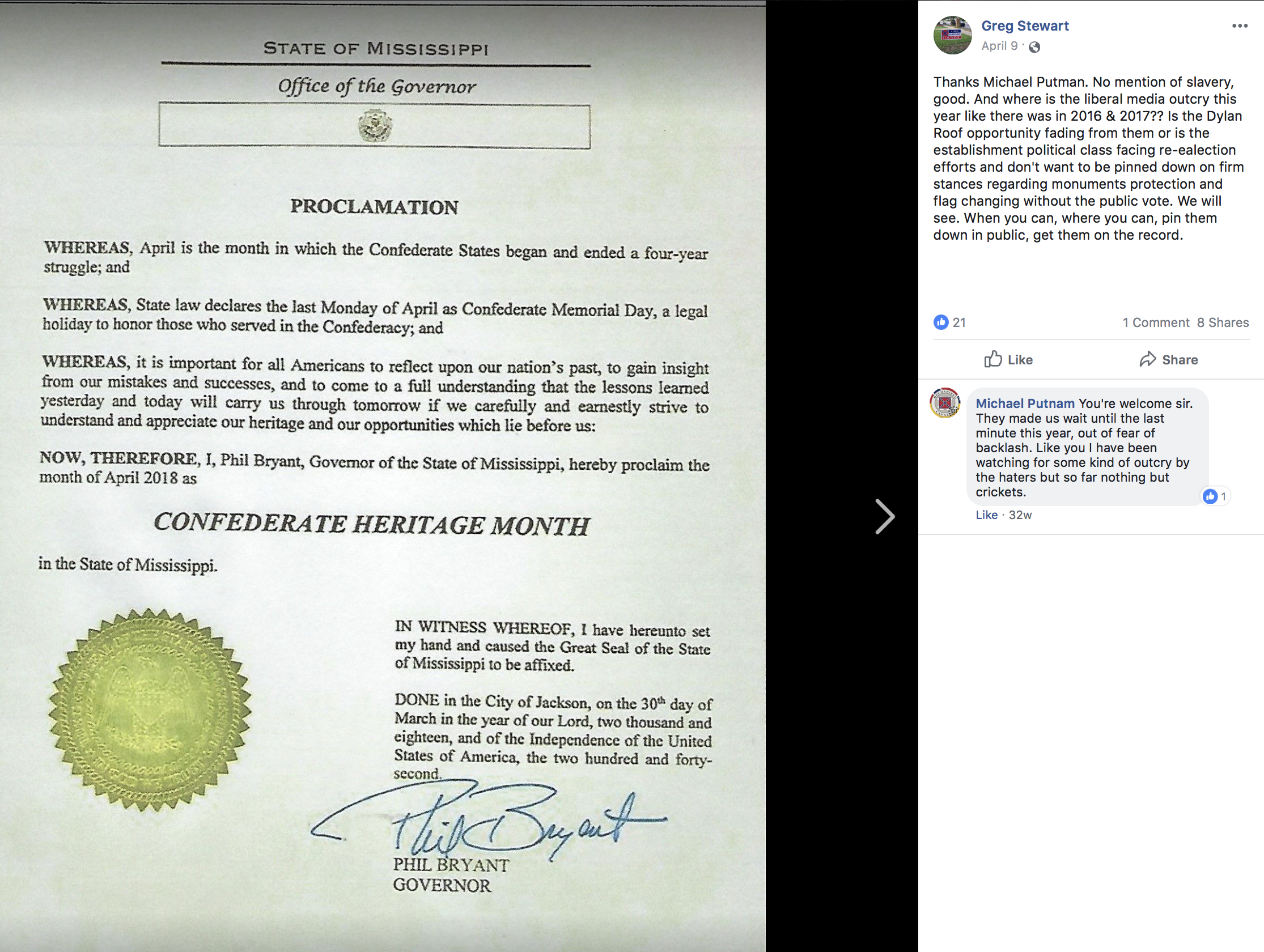
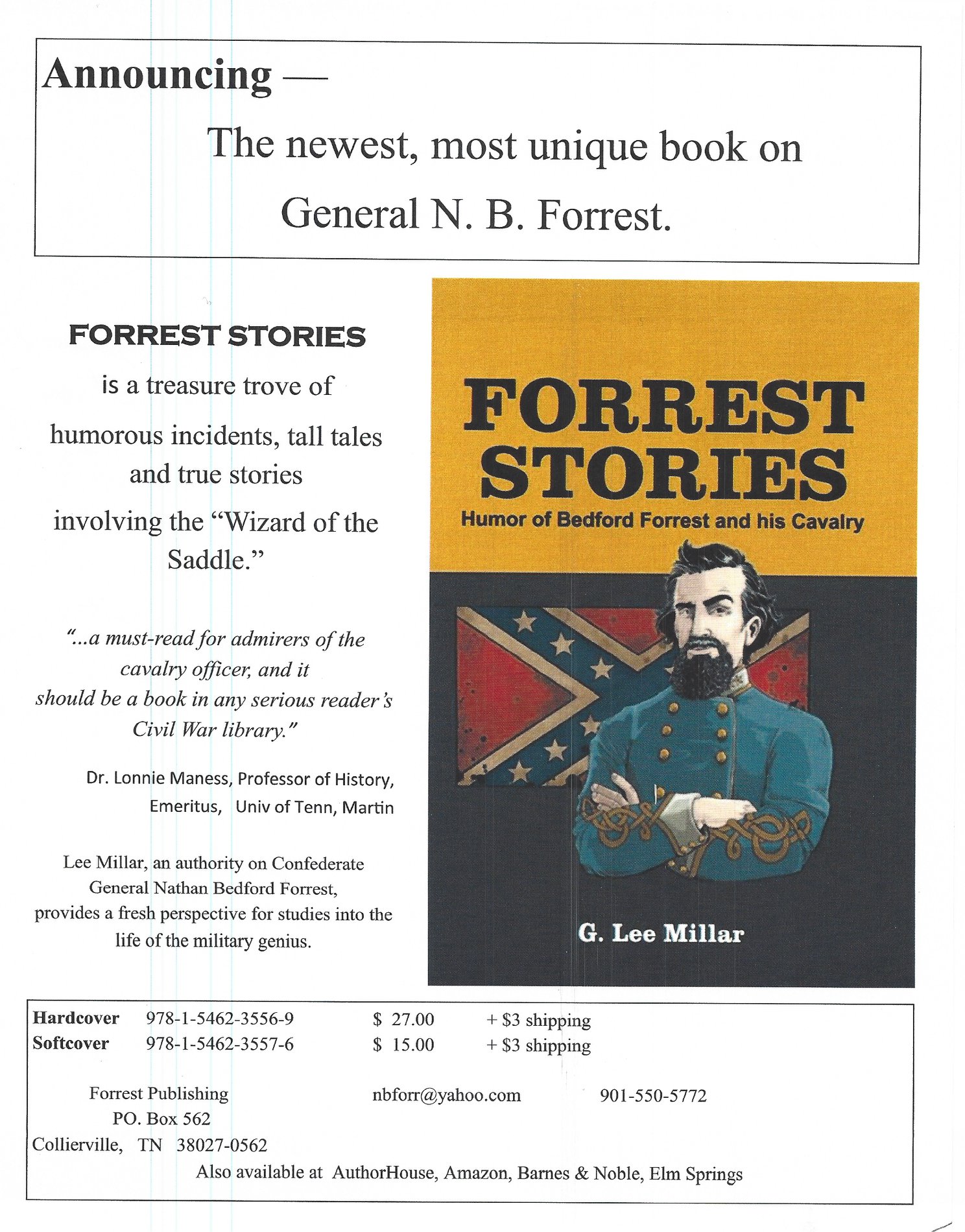
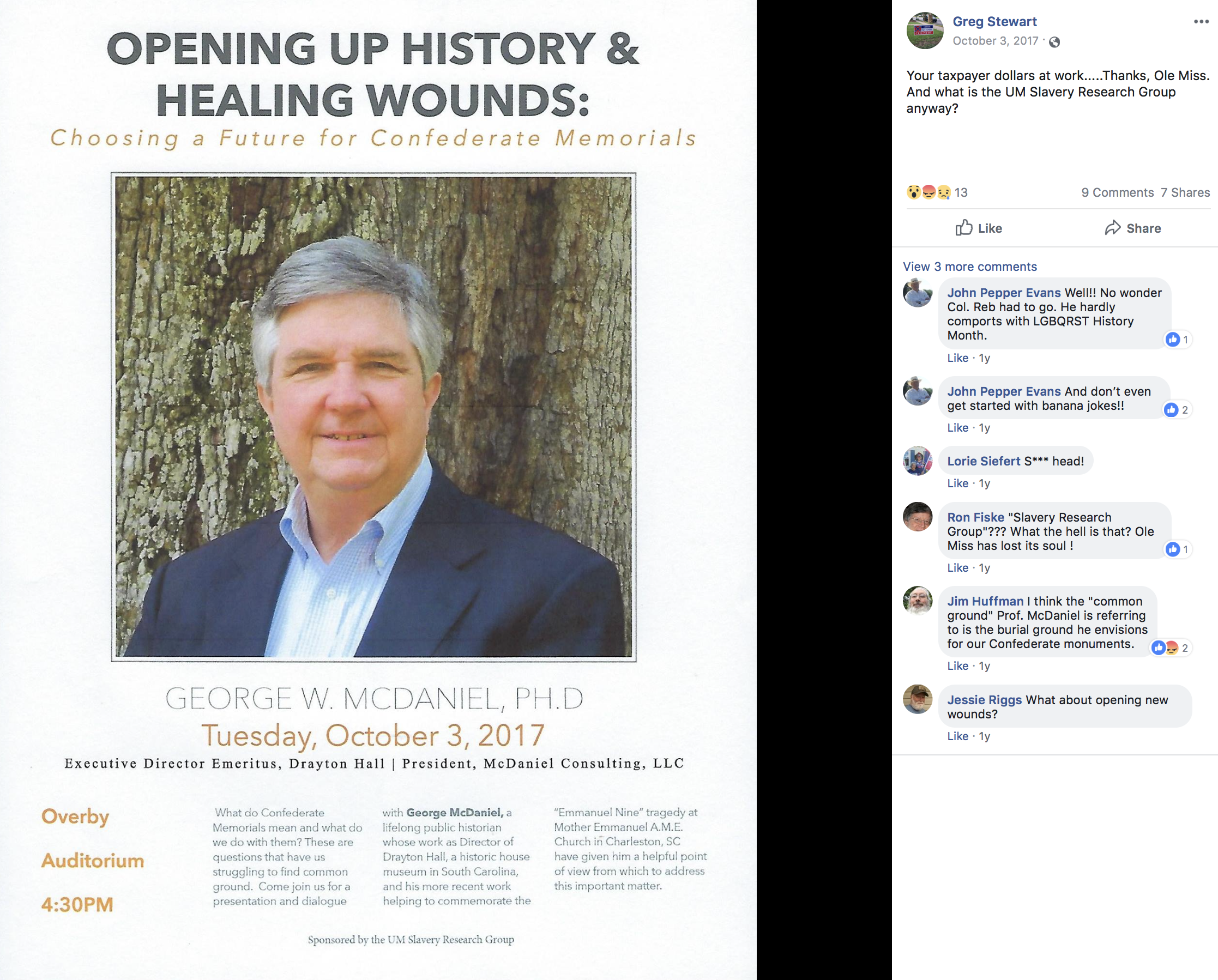

Stewart’s Facebook makes it clear: He isn’t merely a hobbyist; he’s more like a lobbyist for the Confederacy and the Lost Cause movement.
But this election isn’t about him. He’s not on the ballot.
It’s about a candidate who publicly promoted his distorted and bigoted opinions as an example of “Mississippi history at its best!”
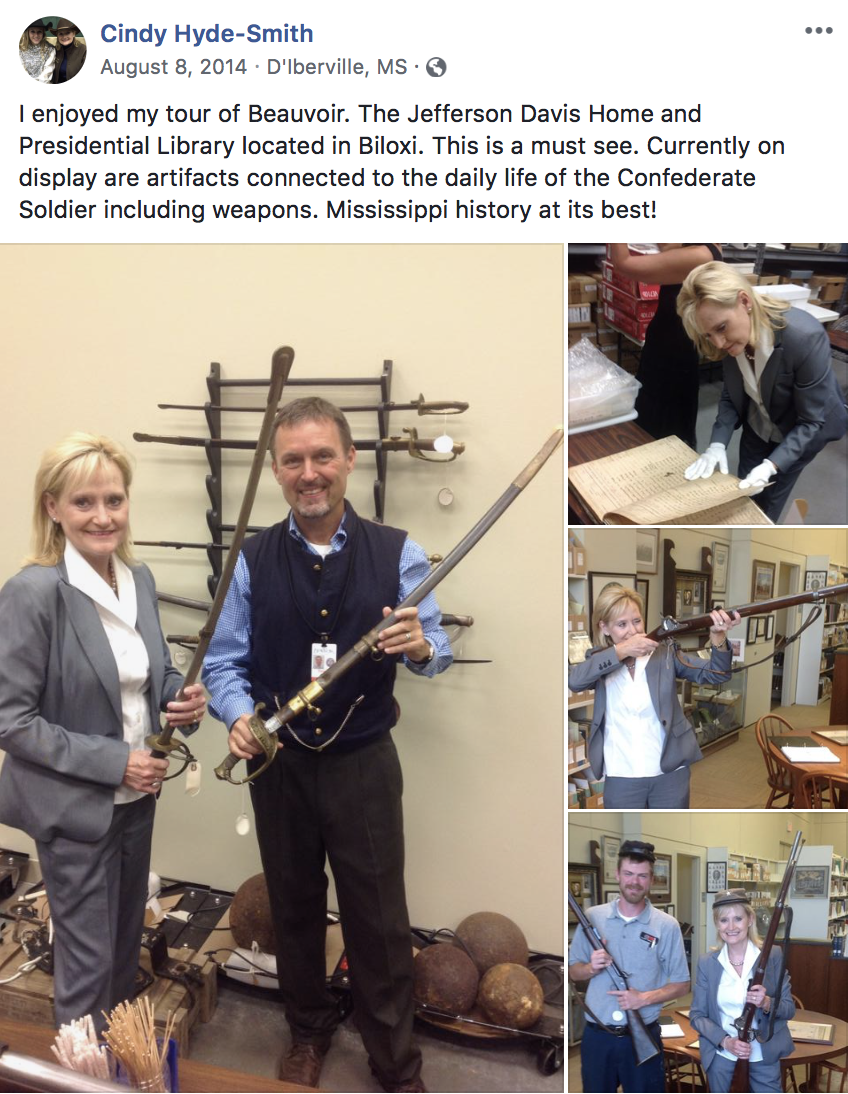
When I first received the video clip of Hyde-Smith’s comment about a “public hanging,” I wasn’t naive about its potential impact or about the inherent risks of sharing it online. The white supremacist movement feels much more emboldened and politically relevant today than it did four years ago, when I broke the story of the third most powerful member of Congress, Rep. Steve Scalise, attending an “international” conference of white nationalists associated with David Duke.
Back then, in the immediate aftermath, I heard Rep. Cedric Richmond, a man for whom I respect and who now represents me in Congress, declare definitively that Scalise didn’t have a “racist bone in his body,” even though Scalise once described himself to a respected columnist as “David Duke without the baggage.” Meanwhile, a handful of in-state corporate media reporters cared more about getting out-scooped by a “blogger” than about getting the story right, relying on the word of David Duke’s former campaign manager and his obviously concocted story about Scalise attending a meeting for a nonexistent neighborhood association that just so happened to be at the same hotel on the same day. Scalise subsequently confirmed his attendance at the hate group conference and apologized for it. Ultimately, Scalise kept his job; Richmond became chairman of the Congressional Black Caucus and an amateur psychiatric orthopedist. I was still nothing more than a haughty, self-aggrandizing blogger.
My reporting was true, but it made things complicated for other reporters who believed they had to go along to get along.
There was also the possibility that calling attention to Hyde-Smith’s comments would unwittingly help her. “You’re just guaranteeing her a greater share of the white racist vote,” a friend told me, in all seriousness.
I don’t believe that is true, but if it is, that – I believe- is an even more compelling reason for us- not only the people of Mississippi but the entire country- to confront them, fearlessly. There is at least one right-leaning poll showing Hyde-Smith comfortably ahead by ten points; to accomplish that, though, they had to severely under-sample African Americans.
Immediately on receiving the first and then the second video, I sought out partnerships with publications in Mississippi. This time, I wouldn’t tackle this alone, only to then get blindsided by journalists who wanted to compete and not collaborate.
Fortunately, I found the Jackson Free Press at the exact moment I needed them most. I already knew their values and how much they aligned with ours. This was a story much bigger than Mississippi, but it had to be told first by Mississipians. I sent them everything I had, and what they didn’t have, I convinced my source to provide it. Their reporting, particularly the articles written by Ashton Pittman, told the story fearlessly and truthfully, and it was an absolute honor to work with Ashton and his indefatigable editor, Donna Ladd.
It has been a highlight of my career, because I know, regardless of the outcome, we told stories that have needed to be heard.
Our collaboration may not be enough to change an election, but it may have already helped turn the page.
